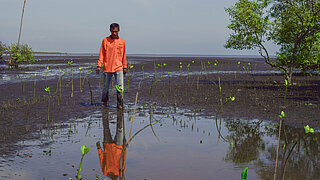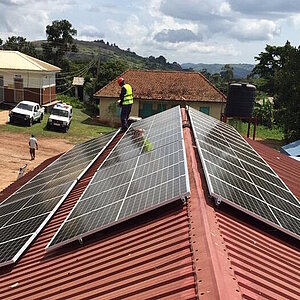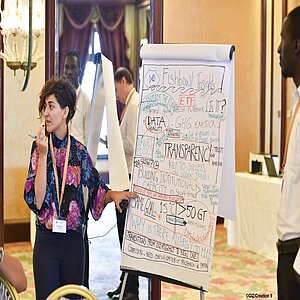Synergies of adaptation, mitigation and sustainable development

Linking climate change adaptation and mitigation leads to stronger climate action and progress on the 2030 Agenda.
Adaptation and mitigation actions represent two sides of the same coin, being intrinsically linked through their impact on sustainable development and resilience to climate change. However, the success of climate action for and beyond the Paris Agreement is still limited by siloed planning and implementation. In practice, mitigation and adaptation strategies and projects are often treated as two distinct pathways through which countries channel funding and steer climate action.
To increase impact, fast progress, and targeted policy-making and project development, thinking and acting in silos needs to be put aside. Strengthening resilience requires jointly set objectives and holistic approaches, striving for multiple benefits for mitigation, adaptation, and sustainable development. To facilitate this, the IKI Support Project for the Implementation of the Paris Agreement (SPA) and Global Factor developed a guide for climate projects to strengthen holistic and sustainable climate action in project planning and implementation.
A guide to strengthen synergies between adaptation and mitigation
The guide is essentially a design thinking process to assist in the development of “multi-benefit” project agendas with joint mitigation, adaptation and socio-economic development goals. Project developers and implementers can use it to review a project’s orientation and objectives, consider the benefits of integrated climate action, and strengthen a project’s embedding at the country context. The guide is best applied in a workshop with representatives from all stakeholder groups relevant for the task at hand. Guiding questions stimulate a discussion on synergies and potential trade-offs while inspiring case studies offer insights on solutions from comparable contexts.
This enables collaboration opportunities between different actors from administration, civil society, and private sector to work jointly towards important objectives, as they are key for the success of projects. The discussion triggered by this process facilitates holistic and effective climate action that in turn contributes to the achievement of national and international sustainable development goals.
Flexible application for different purposes
The guide allows project stakeholders to find new synergies and act efficiently in the achievement of goals when a project is at the implementation stage. Moreover, projects can use the guide to incorporate unforeseen urgencies such as a green recovery from the COVID-19 pandemic or energy and food supply disruptions. In this sense, the guide can be used to update or expand a project according to new needs and requirements.
The guide is not only applicable at project level but can also inform policy or strategy development processes. Here too, it brings together relevant stakeholders to share and find ways to harmonize different perspectives, needs, and goals.
The time required to use the guide and engage in a discussion depends on the availability and motivation of the stakeholders and can vary between a (virtual) 1,5 hours workshop to, ideally, a half-day in-person workshop.
The report A New Narrative of Resilient and Climate Smart Societies - Aligning Adaptation, Mitigation and the SDGs introduces the topic and provides a framing for subsequent discussions.
To facilitate a workshop, a Miro Board has been prepared to discuss key questions in an online setting.
Download
The link has been copied to the clipboard
Contact
IKI Office
Zukunft – Umwelt – Gesellschaft (ZUG) gGmbH
Stresemannstraße 69-71
10963 Berlin

















